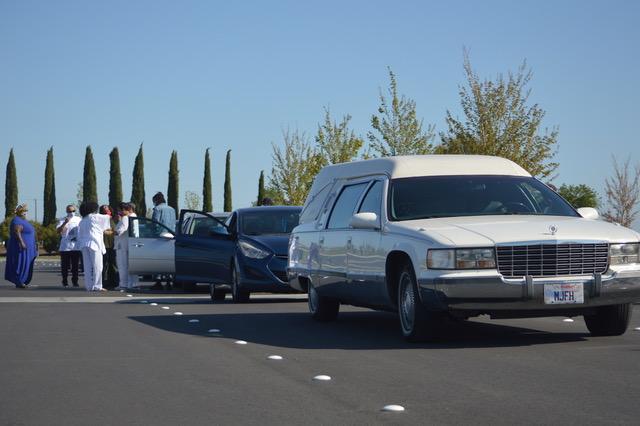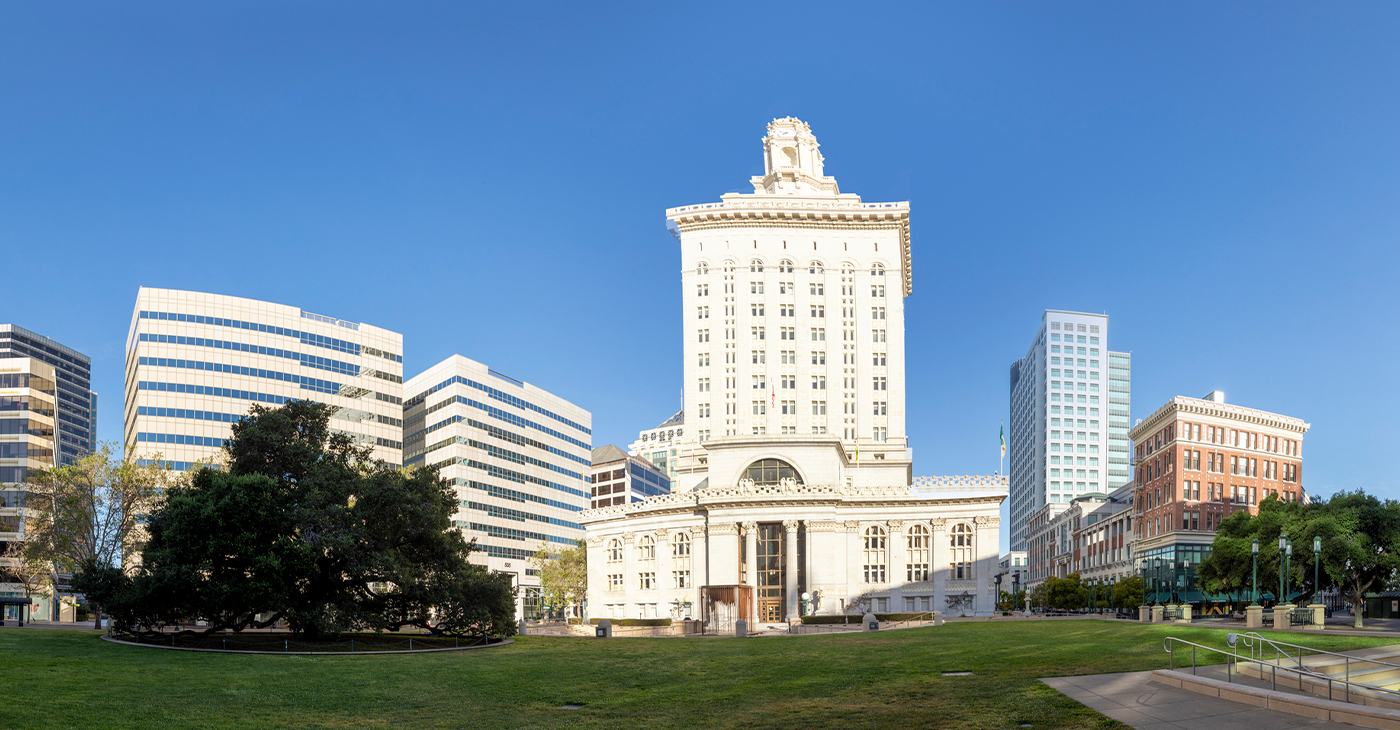Bay Area
No Time to Grieve: COVID-19 Has Changed Funerals and Mourning

It could be the high-profile deaths of African American cultural icons like Little Richard, Andre Harrell or Betty Wright, who all left us recently, or the peaceful passing of a well-known local activist or the sudden death of a close family member.
COVID-19 has changed the way death hits us, and the ways we mourn and memorialize people we respect and love.
Funeral homes across the United States and here in California are taking extraordinary steps to maintain the safety of their staff, mourners, and the general public. They are also going the extra mile to console families having to deal with the loss of a relative while accepting the grim reality of not being able to hold a traditional funeral — all the while doing everything they can to keep their businesses profitable.
“My husband wasn’t embalmed. They put him in a plastic bag and then put him a casket,” said Margo Rose Brunson, a resident of Sacramento, who lost her husband, Charles L. Brunson, a veteran of the U.S. Air Force, to COVID-19 on April 13.
Brunson said she understands that there was nothing the funeral home or the cemetery could do to accommodate the end-of-life arrangements she had planned for her husband. Charles Brunson, who died at 76, was also fighting pneumonia as well as recurring health complications due to stroke and hypertension.
The Brunsons were the co-founders of the Sacramento Branch of the Black Panther Party (BPP), which was in operation from 1968 to 1970. They were also good friends of Bobby Seale, the well-known political activist, Oakland 1973 mayoral candidate, and co-founder of the national arm of BPP with Huey P. Newton. Brunson’s service, handled by Morgan Jones Funeral Home in Sacramento, lasted no more than seven minutes, and the 10 people who attended the burial stayed in their cars.
“In the African-American community, there are so many rituals we all know when it comes to funerals — to burying our people, family members and friends we love,” says Mark McKay, owner and operator of McKay’s Mortuaries in Southern California. He says, so far, he has handled several cases of COVID-19 deaths. McKay’s has locations both in the Los Angeles area and in the Inland Empire.
“It is difficult. People are taking this hard. Imagine crying and having to look in the other direction because you’re making these unusual home going service plans,” he said. For some families whose relatives die of COVID-19, there are “no services, no prayers. They take them straight from the hospital to the cemetery and put them in the ground – or they go to a crematory and burn the bodies.”
Most Black funeral homeowners say they have seen sharp dips in their revenues since most of their customers no longer need auxiliary services like limousine rentals and other costs associated with funeral services.
Funeral homes across California have adopted technologies like Zoom and other streaming services to allow families to watch funeral services remotely online.
For families everywhere in the world, the coronavirus crisis has complicated dying, grieving and funeral services. Across the United States, the Centers for Disease Control and Prevention recommends that people keep a safe distance of six feet between them to avoid spreading or contracting the virus. The state has ordered that no more than 10 people can assemble for a public gathering.
In California, there are 66,680 confirmed COVID-19 cases, according to the California Department of Public Health. So far, the disease has caused the deaths of 2,657 people. More than 260 of the deceased are Black Californians.
Mortician Albert Tillman in Riverside says he approaches funeral services with a sense of duty, but he constantly has to steel his nerves because he’s always thinking about the safety of his 19 employees and guests who attend viewings at this funeral home.
“We sanitize all the time. We follow CDC guidelines. We wear masks,” says Tillman, who does not embalm any bodies of people who died from COVID-19. “What scares me most is the unknown. We just don’t know enough about this virus, that’s why I don’t make decisions that might endanger my staff and the community.”
Activism
Oakland Post: Week of December 25 – 31, 2024
The printed Weekly Edition of the Oakland Post: Week of December 25 – 31, 2024

To enlarge your view of this issue, use the slider, magnifying glass icon or full page icon in the lower right corner of the browser window.
Bay Area
Glydways Breaking Ground on 14-Acre Demonstration Facility at Hilltop Mall
Glydways has been testing its technology at CCTA’s GoMentum Station in Concord for several years. The company plans to install an ambitious 28-mile Autonomous Transit Network in East Contra Costa County. The new Richmond facility will be strategically positioned near that project, according to Glydways.

The Richmond Standard
Glydways, developer of microtransit systems using autonomous, small-scale vehicles, is breaking ground on a 14-acre Development and Demonstration Facility at the former Hilltop Mall property in Richmond, the Contra Costa Transportation Authority (CCTA) reported on social media.
Glydways, which released a statement announcing the project Monday, is using the site while the mall property undergoes a larger redevelopment.
“In the interim, Glydways will use a portion of the property to showcase its technology and conduct safety and reliability testing,” the company said.
Glydways has been testing its technology at CCTA’s GoMentum Station in Concord for several years. The company plans to install an ambitious 28-mile Autonomous Transit Network in East Contra Costa County. The new Richmond facility will be strategically positioned near that project, according to Glydways.
The new Richmond development hub will include “over a mile of dedicated test track, enabling Glydways to refine its solutions in a controlled environment while simulating real-world conditions,” the company said.
Visitors to the facility will be able to experience on-demand travel, explore the control center and visit a showroom featuring virtual reality demonstrations of Glydways projects worldwide.
The hub will also house a 13,000-square-foot maintenance and storage facility to service the growing fleet of Glydcars.
“With this new facility [at the former Hilltop Mall property], we’re giving the public a glimpse of the future, where people can experience ultra-quiet, on-demand transit—just like hailing a rideshare, but with the reliability and affordability of public transit,” said Tim Haile, executive director of CCTA.
Janet Galvez, vice president and investment officer at Prologis, owner of the Hilltop Mall property, said her company is “thrilled” to provide space for Glydways and is continuing to work with the city on future redevelopment plans for the broader mall property.
Richmond City Manager Shasa Curl added that Glydways’ presence “will not only help test new transit solutions but also activate the former Mall site while preparation and finalization of the Hilltop Horizon Specific Plan is underway.
Alameda County
Last City Council Meeting of the Year Ends on Sour Note with Big Budget Cuts
In a five to one vote, with Councilmembers Carroll Fife and Janani Ramachandran excused, the council passed a plan aimed at balancing the $130 million deficit the city is facing. Noel Gallo voted against the plan, previously citing concerns over public safety cuts, while Nikki Fortunato-Bas, Treva Reid, Rebecca Kaplan, Kevin Jenkins, and Dan Kalb voted in agreement with the plan.

By Magaly Muñoz
In the last lengthy Tuesday meeting of the Oakland City Council for 2024, residents expressed strong opposition to the much needed budget cuts before a change in leadership was finalized with the certification of election results.
In a five to one vote, with Councilmembers Carroll Fife and Janani Ramachandran excused, the council passed a plan aimed at balancing the $130 million deficit the city is facing. Noel Gallo voted against the plan, previously citing concerns over public safety cuts, while Nikki Fortunato-Bas, Treva Reid, Rebecca Kaplan, Kevin Jenkins, and Dan Kalb voted in agreement with the plan.
Oakland police and fire departments, the ambassador program, and city arts and culture will all see significant cuts over the course of two phases.
Phase 1 will eliminate two police academies, brown out two fire stations, eliminate the ambassador program, and reduce police overtime by nearly $25 million. These, with several other cuts across departments, aim to save the city $60 million. In addition, the council simultaneously approved to transfer restricted funds into its general purpose fund, amounting to over $40 million.
Phase 2 includes additional fire station brownouts and the elimination of 91 jobs, aiming to recover almost $16 million in order to balance the rest of the budget.
Several organizations and residents spoke out at the meeting in hopes of swaying the council to not make cuts to their programs.
East Oakland Senior Center volunteers and members, and homeless advocates, filled the plaza just outside of City Hall with rallies to show their disapproval of the new budget plan. Senior residents told the council to “remember that you’ll get old too” and that disturbing their resources will only bring problems for an already struggling community.
While city staff announced that there would not be complete cuts to senior center facilities, there would be significant reductions to staff and possibly inter-program services down the line.
Exiting council member and interim mayor Bas told the public that she is still hopeful that the one-time $125 million Coliseum sale deal will proceed in the near future so that the city would not have to continue with drastic cuts. The deal was intended to save the city for fiscal year 2024-25, but a hold up at the county level has paused any progress and therefore millions of dollars in funds Oakland desperately needs.
The Coliseum sale has been a contentious one. Residents and city leaders were originally against using the deal as a way to balance the budget, citing doubts about the sellers, the African American Sports and Entertainment Group’s (AASEG), ability to complete the deal. Council members Reid, Ramachandran, and Gallo have called several emergency meetings to understand where the first installments of the sale are, with little to no answers.
Bas added that as the new Alameda County Supervisor for D5, a position she starts in a few weeks, she will do everything in her power to push the Coliseum sale along.
The city is also considering a sales tax measure to put on the special election ballot on April 15, 2025, which will also serve as an election to fill the now vacant D2 and mayor positions. The tax increase would raise approximately $29 million annually for Oakland, allowing the city to gain much-needed revenue for the next two-year budget.
The council will discuss the possible sales tax measure on January 9.
-

 Activism4 weeks ago
Activism4 weeks agoOakland Post: Week of November 27 – December 3, 2024
-

 Activism3 weeks ago
Activism3 weeks agoButler, Lee Celebrate Passage of Bill to Honor Congresswoman Shirley Chisholm with Congressional Gold Medal
-

 Activism3 weeks ago
Activism3 weeks agoPost News Group to Host Second Town Hall on Racism, Hate Crimes
-

 Activism3 weeks ago
Activism3 weeks agoDelta Sigma Theta Alumnae Chapters Host World AIDS Day Event
-

 Business3 weeks ago
Business3 weeks agoLandlords Are Using AI to Raise Rents — And California Cities Are Leading the Pushback
-

 Arts and Culture1 week ago
Arts and Culture1 week agoPromise Marks Performs Songs of Etta James in One-Woman Show, “A Sunday Kind of Love” at the Black Repertory Theater in Berkeley
-

 Activism3 weeks ago
Activism3 weeks agoOakland Post: Week of December 4 – 10, 2024
-

 Activism2 weeks ago
Activism2 weeks agoOakland Post: Week of December 11 – 17, 2024



























































